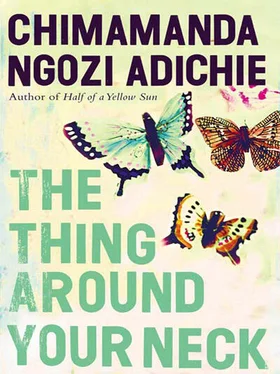* * *
Nnamabia’s first shock was seeing the Buccaneer sobbing. The boy was tall and tough, rumored to have carried out one of the killings, to be in line for Capone next semester, and yet there he was in the cell cowering and sobbing after the chief had given him a knock behind the head. Nnamabia told me this on our visit the following day, in a voice lined with both disgust and disappointment; it was as if he had suddenly been made to see that the Incredible Hulk was really just green paint. His second shock, a few days later, was Cell One, the cell beyond his. Two policemen had carried out a swollen dead man from Cell One and stopped by Nnamabia’s cell to make sure the corpse was seen by all.
Even the chief of his cell seemed afraid of Cell One. When Nnamabia and his cell mates, those who could afford to buy bathing water in the plastic buckets that had once held paint, were let out to bathe in the open yard, the policemen watched them and often shouted, “Stop that or you are going to Cell One now!” Nnamabia had nightmares about Cell One. He could not imagine a place worse than his cell, which was so crowded he often stood pressed against the cracked wall. Tiny kwalikwata lived inside the cracks and their bites were vicious, and when he yelped his cell mates called him Milk and Banana Boy, University Boy, Yeye Fine Boy.
They were too tiny to bite so painfully, those bugs. The biting was worse during the night, when they all had to sleep on their sides, head to foot, except the chief with his whole back lavishly on the floor. It was the chief who shared the plates of garri and watery soup that were pushed into the cell everyday. Each person got two mouthfuls. Nnamabia told us this during the first week. As he spoke I wondered if the bugs in the wall had bitten his face, too, or if the bumps spreading all over his forehead had come from an infection. Some of them were tipped with pus the color of cream. He scratched at them as he said, “I had to shit in a waterproof bag today, standing up. The toilet was too full. They flush it only on Saturdays.”
His tone was histrionic. I wanted to ask him to shut up, because he was enjoying his new role as the sufferer of indignities, and because he did not understand how lucky he was that the policemen allowed him to come out and eat our food, how stupid he’d been to stay out drinking that night, how uncertain his chances were of being released.
We visited him every day of the first week. We went in my father’s old Volvo because my mother’s older Peugeot 504 was considered unsafe for trips outside Nsukka. When we passed the police checkpoints on the road, I noticed that my parents were different — subtly so, but different. My father no longer delivered a monologue, as soon as we were waved on, on how illiterate and corrupt the police were. He did not bring up the day they had delayed us for an hour because he refused to bribe them, or the way they had stopped a bus in which my beautiful cousin Ogechi was traveling and singled her out and called her a whore because she had two cell phones and asked her for so much money that she knelt on the ground in the rain begging them to let her go since her bus had already been allowed to go. My mother did not mumble, They are symptoms of a larger malaise. Instead my parents remained silent. It was as if refusing to criticize the police as usual would somehow make Nnamabia’s freedom imminent. “Delicate” was the word the superintendent at Nsukka had used. Getting Nnamabia out anytime soon would be delicate, especially with the police commissioner in Enugu giving gloating, preening interviews on television about the arrested cultists. The cult problem was serious. Big Men in Abuja were following events. Everybody wanted to appear to be doing something.
The second week, I told my parents we were not going to visit Nnamabia. We did not know how long we would have to keep doing this and petrol was too expensive to drive three hours every day and it would not hurt Nnamabia to fend for himself for a day.
My father looked at me, surprised, and asked, “What do you mean?” My mother eyed me up and down and headed for the door and said nobody was begging me to come; I could sit there and do nothing while my innocent brother suffered. She was walking toward the car and I ran after her, and when I got outside I was not sure what to do, so I picked up a stone near the ixora bush and hurled it at the windshield of the Volvo. The windshield cracked. I heard the brittle sound and saw the tiny lines spreading like rays on the glass before I turned and dashed upstairs and locked myself in my room to protect myself from my mother’s fury. I heard her shouting. I heard my father’s voice. Finally there was silence, and I did not hear the car start. Nobody went to see Nnamabia that day. It surprised me, this little victory.
We visited him the next day. We said nothing about the windshield, although the cracks had spread out like ripples on a frozen stream. The policeman at the desk, the pleasant dark-skinned one, asked why we had not come the day before; he had missed my mother’s jollof rice. I expected Nnamabia to ask, too, even to be upset, but he looked oddly sober, an expression I had not seen before. He did not eat all of his rice. He kept looking away, toward the cluster of half-burned cars at the end of the compound, the remnants of accidents.
“What is wrong?” my mother asked, and Nnamabia began to speak almost immediately, as if he had been waiting to be asked. His Igbo was even-toned, his voice neither rising nor falling. An old man had been pushed into his cell the day before, a man perhaps in his mid-seventies, white-haired, skin finely wrinkled, with the old-fashioned refinement of an incorruptible retired civil servant. His son was wanted for armed robbery, and when the police could not find the son, they decided to lock him up instead.
“The man did nothing,” Nnamabia said.
“But you did nothing, too,” my mother said.
Nnamabia shook his head as if she did not understand. In the following days, he was more subdued. He spoke less, and mostly about the old man: how he had no money and could not buy bathing water, how the other men made fun of him or accused him of hiding his son, how the chief ignored him, how he looked frightened and so terribly small.
“Does he know where his son is?” my mother asked.
“He has not seen his son in four months,” Nnamabia said.
My father said something about how it was irrelevant whether or not the man knew where his son was.
“Of course,” my mother said. “It is wrong, but this is what the police do all the time. If they do not find the person they are looking for, they will lock up his father or his mother or his relative.”
My father brushed at something on his knee — an impatient gesture. He did not understand why my mother was stating the obvious.
“The man is ill,” Nnamabia said. “His hands shake and shake, even when he’s asleep.”
My parents were silent. Nnamabia closed the food flask of rice and turned to my father. “I want to give him some of this, but if I bring it into the cell General Abacha will take it.”
My father went over and asked the policeman at the desk if we could be allowed to see the old man in Nnamabia’s cell for a few minutes. The policeman was the light-skinned, acerbic one who never said thank you when my mother handed over the rice and money bribe. Now he sneered in my father’s face and said he could well lose his job for letting Nnamabia out and yet we were asking for another person to be allowed out? Did we think this was a boarding school visiting day? Didn’t we know that this was a high-security holding place for criminal elements of society? My father came back and sat down with a sigh and Nnamabia silently scratched at his bumpy face.
Читать дальше











